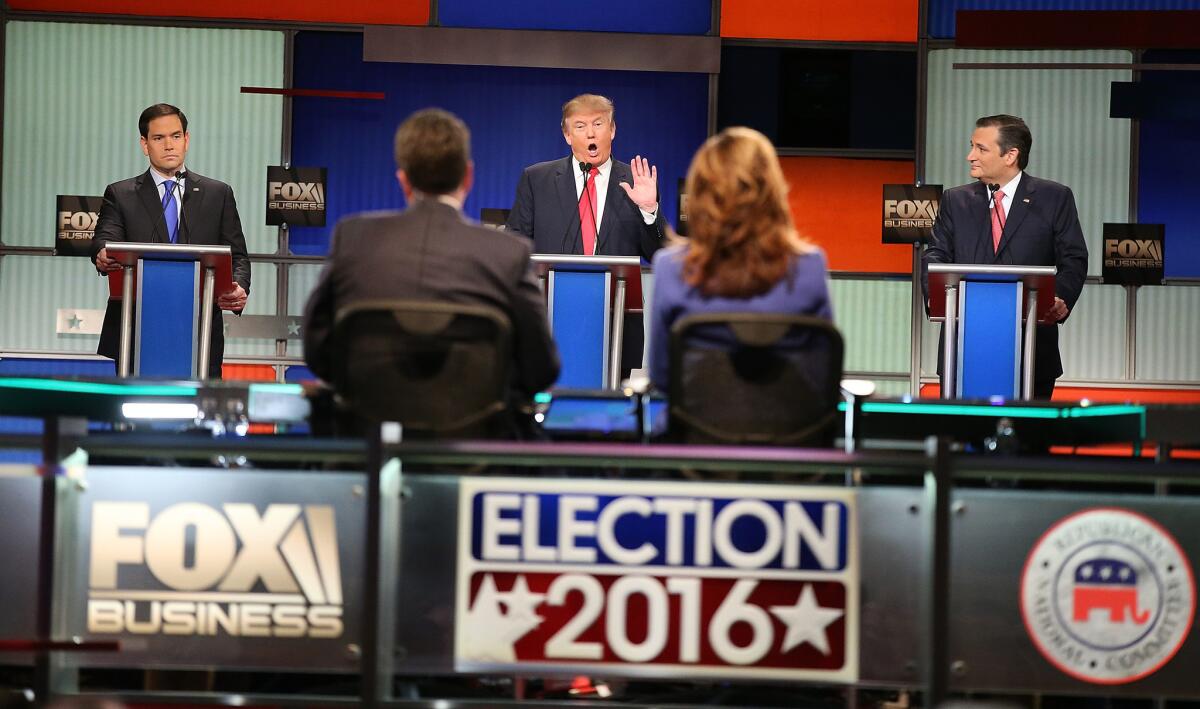Increasingly sharp attacks highlight Republican debate

Marco Rubio, left, Donald Trump and Ted Cruz take part in the Republican debate in North Charleston, S.C.
- Share via
Reporting from North Charleston, S.C. — The Republican presidential candidates brought increasingly hostile internecine attacks from the campaign trail into prime time on Thursday, clashing over citizenship and conservatism in a contentious debate that reflected the wide-open nature of the nomination battle just weeks before the first votes will be cast.
The first prime-time debate of the new year in some ways bore little resemblance to the five that preceded it. The most obvious difference was the number of candidates participating on the main stage, seven, down from a high of 11.
That smaller stage showcased the dynamic of the race: a tight contest in Iowa where Sen. Ted Cruz’s organization and grass-roots appeal have made inroads against Donald Trump’s persistent national advantage; a fierce fight among governors looking to position themselves for a strong showing in the New Hampshire primary; and the uncertainty about what happens after that in South Carolina, the site of Thursday’s debate.
In the debate’s earliest moments, the party hopefuls focused on Democrats: President Obama and the leading candidate to succeed him in the party, Hillary Clinton. New Jersey Gov. Chris Christie called the president’s State of the Union address “story time.”
Former Florida Gov. Jeb Bush warned that Clinton, if elected, “might be going back and forth between the White House and the courthouse” amid investigations of her email practices.
But the tenor changed quickly as moderators asked about comments Trump has made in which he questioned whether Cruz, the Texas senator, who was born in Canada, is constitutionally eligible to be president.
Cruz, who has said he is qualified because he is the son of an American citizen, suggested Trump is only raising the issue now because he fears losing the first contest of the season, in Iowa’s caucuses on Feb. 1.
“I would suggest we focus on who’s best prepared to be commander-in-chief, because that’s the most important question facing the country,” he said.
Trump acknowledged he has raised the issue because Cruz has become a more viable threat, but said it was a legitimate concern. Democrats would probably sue over the issue if Cruz became the nominee, he said.
“You can’t do that to our party, you really can’t,” Trump said.
Trump entered the night fresh off an NBC News survey that found he had expanded his lead over the field nationally. One-third of Republican voters favored the real estate mogul, compared with 20% for Cruz, 13% for Florida Sen. Marco Rubio and 12% for Ben Carson.
The billionaire real estate developer has faced his highest-profile attacks to date this week, not only from Cruz but from Obama and South Carolina Republican Gov. Nikki Haley.
Earlier this week, giving the GOP response to Obama’s State of Union speech, Haley told her own family’s immigration story – her parents were born in India – and warned against “the siren call of the angriest voices.”
Trump, who initially fired back at Haley in television interviews, said in the debate that he stood by his negative tone.
“I will gladly accept the mantle of anger,” he said. “I’m very angry because our country is being run horribly.”
Trump’s resilience has baffled and concerned mainstream leaders of both parties, who see his mix of doomsaying and anti-immigrant fervor as dangerous and, in the case of Republicans, potentially damaging to the party’s image. Obama devoted much of his speech to an implicit rebuke of Trumpism, defining America as neither in decline nor hostile toward immigrants and Muslims.
Trump and Cruz were at center stage after days of increased sparring. They are as close as they’ve been in competing for the lead in Iowa, according to polls, and Cruz is in second place in several other states.
Other clashes played out among the other four candidates remaining on the main stage -- Rubio, Christie, Bush and Ohio Gov. John Kasich – as they jockey for a strong showing in New Hampshire that could propel them into contention.
Rubio took after Christie, alleging that he had a track record of supporting liberal causes, including Planned Parenthood. Christie retorted that Rubio, who in a previous debate had brushed off attacks from Bush as a sign of weakness, was now doing the same.
Later in the debate Rubio turned to Cruz, first critiquing his tax plan and then cataloging what he argued were shifting positions on issues of importance to the party’s core voters.
“That is not consistent conservatism. That’s political calculation,” he said.
Bush, who has often struggled to land attacks on his foes, said the tough talk would continue but stressed the need for the party to ultimately come together.
“Everybody’s record is going to be scrutinized,” he said. But “at the end of the day we need to unite behind the winner so we can defeat Hillary Clinton, because she is a disaster.”
The candidates broadly agreed on issues including gun control and foreign policy. With Kentucky Sen. Rand Paul no longer on the main stage, the range of foreign policy views, in particular, was notably narrowed.
Paul chose not to participate in an earlier forum with former Hewlett-Packard Chief Executive Carly Fiorina, former Pennsylvania Sen. Rick Santorum and former Arkansas Gov. Mike Huckabee after he failed to meet polling criteria to participate in the main debate.
Neurosurgeon Ben Carson, whose standing in polls has returned to earth after a brief stint as a co-leader with Trump, was largely a nonfactor this time around, even joking about his low-key demeanor when he got an early question.
“I was going to ask you to wake me up when that time came,” he said.
Rubio is seen by Cruz as the main competitor for the non-Trump vote and by the other mainstream candidates as the man to catch in their lane. Rubio has tried to stake out a position as the most aggressive and thoughtful candidate on foreign policy, which has become an increasingly important subject to Americans who fear terrorism at home and instability in the Middle East.
Even now, months into the race, pollsters caution that it is too early to declare a winner in any of the early primary states. Exit polls in New Hampshire have shown that as many of one-fifth of voters make up their minds on the day of the primary and more than a third have not made up their minds three days out in past elections, according to Andrew Smith, director of the University of New Hampshire Survey Center. Smith notes that candidates who have held larger leads than Trump at this stage have lost.
“Polls conducted even in the last weekend of the election are wrong as often as they are right,” he said. “These people are just starting to pay attention to the race now, and they still are in the process of making up their minds.”
Bierman reported from North Charleston and Memoli from Washington.
For more campaign coverage, follow @noahbierman and @mikememoli
More to Read
Get the L.A. Times Politics newsletter
Deeply reported insights into legislation, politics and policy from Sacramento, Washington and beyond. In your inbox twice per week.
You may occasionally receive promotional content from the Los Angeles Times.












